Babies can have a variety of foods once they are about six months old. It is important that you make right food choices to provide your baby with a healthy and balanced diet that is packed with important vitamins and nutrients required for proper growth. New parents often have questions when they decide to introduce something new, such as chocolate, in their baby's diet. So is it a good idea to introduce chocolate to your baby? Let's find out now!
Can Babies Eat Chocolate?
While babies can have it, it is best to wait and avoid it altogether for some time at least. The reason is that chocolate contains caffeine. Although the amount of caffeine found in chocolates is small, it can still cause negative reactions in babies. Moreover, chocolate may also contain other stimulants – it has the combination of sugar and milk that babies may not be able to handle. Theobromine and phenylethylamine are other stimulants found in chocolate, which can cause negative health effects. It may also affect the functioning of the brain, mainly due to the presence of anandamide. Giving chocolate regularly to your baby may also increase their heartbeat and cause other reactions too.
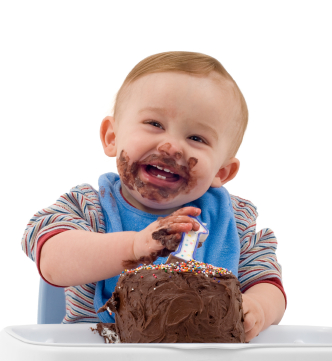
When Is It Okay?
Can babies eat chocolate? Wait till your baby is a year old. It is worth pointing out that many people are of the view that it is possible to be allergic to chocolate, but the reality is that you can only be allergic to ingredients found in chocolate, such as peanuts, soy, dairy, tree nuts, etc. It is therefore a good idea to give chocolate to your baby only when he is at least a year old. If you really want to introduce it earlier, you should consider opting for chocolate types that do not have other potential allergens. Going with the darker chocolate varieties is a better choice.
8 More Foods You Should Wait to Give Your Baby
Can babies eat chocolate? It's best to wait to avoid any negative reactions or allergies. And besides chocolate, there are many other foods that should not be given to your baby.
1. Crisps and Crackers
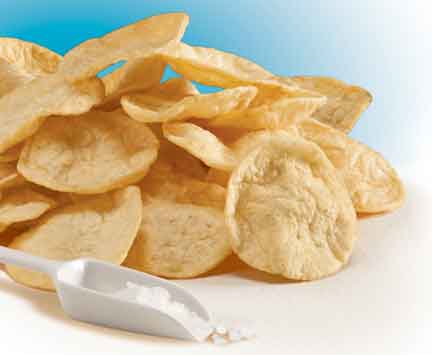 Giving crisps and crackers to your baby will not satisfy your baby's appetite but leave little room for any nutrient-rich food. They also contain salt, which can cause certain complications, especially considering the fact that your baby only needs less than a gram of sodium a day. A baby's kidneys just cannot handle so much of salt. Moreover, the amount of salt your baby needs usually comes from breast milk, so any additional salt coming from crisps and crackers is only going to cause problems. Try fresh fruit and chopped veggies if you are really looking for a quick snack for your little one.
Giving crisps and crackers to your baby will not satisfy your baby's appetite but leave little room for any nutrient-rich food. They also contain salt, which can cause certain complications, especially considering the fact that your baby only needs less than a gram of sodium a day. A baby's kidneys just cannot handle so much of salt. Moreover, the amount of salt your baby needs usually comes from breast milk, so any additional salt coming from crisps and crackers is only going to cause problems. Try fresh fruit and chopped veggies if you are really looking for a quick snack for your little one.
2. Fizzy Drinks
.jpg) Avoid fizzy drinks at all cost because they contain little nutritional value and are acidic enough to damage your baby's teeth. Some of these drinks also contain added sugar and caffeine that can cause obesity in toddlers and even lead to several other health complications. Stick to breast or formula milk as well as drinks of water when your baby is about six months old.
Avoid fizzy drinks at all cost because they contain little nutritional value and are acidic enough to damage your baby's teeth. Some of these drinks also contain added sugar and caffeine that can cause obesity in toddlers and even lead to several other health complications. Stick to breast or formula milk as well as drinks of water when your baby is about six months old.
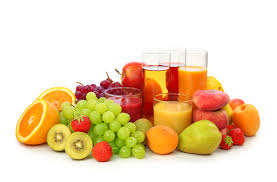 3. Fruit Juice
3. Fruit Juice
That is right – you should avoid giving fruit juice to your baby. That is mainly because they contain high levels of sugars and are acidic in nature. You can opt for diluted vegetable or fruit juice once your baby is old enough to digest solid foods. Be sure to dilute it by mixing one part of juice in 10 parts of water.
4. Honey
 It is a good idea to avoid honey or anything made with honey when your baby is about six months old. Honey is packed with sugar and may also have the spores of the bacteria Clostridium botulinum. These spores can lead to botulism in babies who are under one year old. The condition can lead to several complications, including weakened sucking, constipation, lethargy, and poor appetite. It sometimes also leads to dehydration and pneumonia. Leave honey out of your baby's diet until his first birthday.
It is a good idea to avoid honey or anything made with honey when your baby is about six months old. Honey is packed with sugar and may also have the spores of the bacteria Clostridium botulinum. These spores can lead to botulism in babies who are under one year old. The condition can lead to several complications, including weakened sucking, constipation, lethargy, and poor appetite. It sometimes also leads to dehydration and pneumonia. Leave honey out of your baby's diet until his first birthday.
5. Cow's Milk
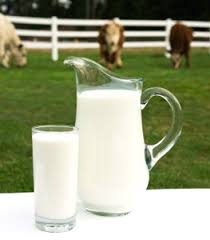 While it is good for adults, cow's milk can cause problems in babies less than 1 year of age. Your baby's stomach is not developed enough to digest protein in cow's milk. Moreover, breast milk is always a better choice because it also contains vitamin C and iron, which cow's milk is completely devoid of. After your baby is 8 months old, you can try whole-milk yogurt, hard cheese, and cottage cheese. Only introduce whole cow's milk in the diet once your baby is at least 1 year old.
While it is good for adults, cow's milk can cause problems in babies less than 1 year of age. Your baby's stomach is not developed enough to digest protein in cow's milk. Moreover, breast milk is always a better choice because it also contains vitamin C and iron, which cow's milk is completely devoid of. After your baby is 8 months old, you can try whole-milk yogurt, hard cheese, and cottage cheese. Only introduce whole cow's milk in the diet once your baby is at least 1 year old.
6. Sugary Treats
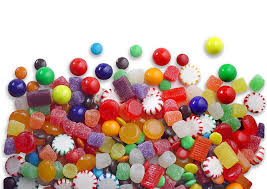 There is no need to give sugary treats to your little angel. Added sugar is always bad, and you have to understand that your baby's taste buds are more open to flavors other than sweet – they may be more responsive to flavors, such as tangy, sharp, tart, and even bitter. Instead of sugary treats, go for naturally sweet alternatives such as bananas. Do not add something sweet to everything you give your baby to eat. Introduce hard candies and other sugary treats only after your baby's first birthday.
There is no need to give sugary treats to your little angel. Added sugar is always bad, and you have to understand that your baby's taste buds are more open to flavors other than sweet – they may be more responsive to flavors, such as tangy, sharp, tart, and even bitter. Instead of sugary treats, go for naturally sweet alternatives such as bananas. Do not add something sweet to everything you give your baby to eat. Introduce hard candies and other sugary treats only after your baby's first birthday.
7. Choking Hazards
 Avoid anything with a potential risk of choking. In other words, you should avoid giving anything to your baby that does not dissolve in the mouth. Opt for something that your baby can mash with the gums. Anything that can be sucked into the windpipe should be off menu. The most common examples are whole peas, uncooked raisins, raw firm-fleshed vegetables, and fruits, such as unripe pears, grapes, etc. Introduce foods that require chewing, such as small slices of poultry, seedless grapes, or raw apples when the molars come in around your baby's first birthday.
Avoid anything with a potential risk of choking. In other words, you should avoid giving anything to your baby that does not dissolve in the mouth. Opt for something that your baby can mash with the gums. Anything that can be sucked into the windpipe should be off menu. The most common examples are whole peas, uncooked raisins, raw firm-fleshed vegetables, and fruits, such as unripe pears, grapes, etc. Introduce foods that require chewing, such as small slices of poultry, seedless grapes, or raw apples when the molars come in around your baby's first birthday.
8. High Mercury Fish
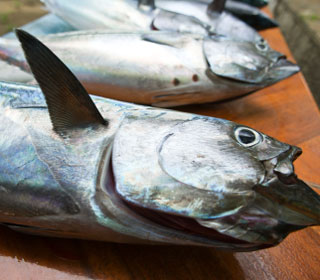 Fish is good for your baby's health because it improves IQ, but it is important to avoid high mercury fish, such as swordfish, hark, tilefish, king mackerel, and fresh tuna. Fish from contaminated waters should never find a place in your baby's diet. Opt for other safer options, such as hake, haddock, whitefish, ocean perch, flounder, tilapia, sole, wild salmon, and scallops. Canned tuna is allowed, but avoid albacore tuna and give it to your baby in moderation.
Fish is good for your baby's health because it improves IQ, but it is important to avoid high mercury fish, such as swordfish, hark, tilefish, king mackerel, and fresh tuna. Fish from contaminated waters should never find a place in your baby's diet. Opt for other safer options, such as hake, haddock, whitefish, ocean perch, flounder, tilapia, sole, wild salmon, and scallops. Canned tuna is allowed, but avoid albacore tuna and give it to your baby in moderation.
